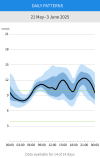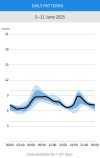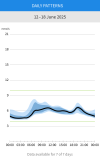Dynamic Penguin
Member
Hi, this is my first thread and I wanted to have a rant/make some observations about my general experiences with Type 2. Sorry it might be a bit long.
I was diagnosed just before lockdown, I can’t remember what my first HA1c was but it was high. I had the usual stern talk about not eating cakes and sweets and losing weight and was packed off with some metformin and a link to an online course.
To be fair, I was a bit on the podgy side (even though cakes and sweets are not really my thing) so I did the course, tweaked my diet to be more like the Mediterranean diet, switched white bread, pasta and rice to whole grain and upped my exercise. And lost a couple of stone. By my next review my A1c was back in the pre diabetic range. Happy days, or so I thought. Still I was told to keep on the metformin and given a statin as my cholesterol was a little high.
Then I hit menopause. Still doing the same stuff, kept all but half a stone of the weight off but my next review A1c was up again. Same lecture about cakes and sweets, to look at the online stuff, exercise, and to up the metformin to two a day. I was miffed at the assumptions about my diet and exercise ( I’m generally pretty active) but did what they asked.
The next few reviews there was no change or the A1c was slightly higher - same patronising lectures each time. A brief trial of 3 metformin a day, which left me feeling like ****, so I stuck at 2. Nothing appeared to have much of an impact, and now it was increasingly hard to lose weight - I would literally gain and lose the same 4-5 pounds. I was massively frustrated and annoyed that every review was the same.
Then a month or so ago I was offered to take part in a study looking at T2 and diet and jumped at the chance. Partly because I had read Invisible Women which highlights how rarely women are included in medical studies, and partly because they would give me a CGM.
I had my bloods done and again, despite there being no major changes to my diet, my A1c was up to 68. I got a CGM and was told for the first 2 weeks to eat more or less normally, so I decided to run some experiments of my own to see what spiked my blood sugar by tracking what I ate against the CGM output. It was interesting - two bits of whole grain toast spiked higher than a couple of beers on a night out. Any bread, whether white, whole grain, previously frozen, with or without fats and protein it made no difference massive spikes every time.

For those first two weeks my blood sugar was all over the place, early morning spikes, spikes after each meal and staying high most of the time.
Then I was switched to a low calorie (1k calories per day) low carb diet for the next 4 weeks. Part of the idea was to look at the impact of weight loss vs diet alone. This was supported with a booklet of guidelines and some menu suggestions.
The difference was pretty much instantaneous, you could see the impact on my blood sugar dramatically from day 1.

I am just over 2 weeks in and the difference is staggering. While I have lost weight (difficult not to on 1k cals per day), more importantly in my second week my levels have dropped to the normal range and they are more stable.

There are still a couple of weeks to go and a final set of bloods but I am seriously considering self-funding a CGM for a couple of weeks while I up the calories to a more sustainable level.
Now here is my main issue, for the past 3 years at least I have gone in for my review, my numbers have slowly risen but nothing different has been suggested. All I get told is to stop eating things I don’t really eat, to eat whole grains and wholemeal, and to keep taking the tablets. What is the point if it is clear that this is having no effect at all? Was the plan that I just drift along with everything getting gradually worse and more medications being thrown at me? Why were there no alternatives suggested? Even a noncommittal have your tried x, some people have found it helps would have been better than nothing. I wonder what this may have cost me health wise over the past few years.
If I had been given a CGM for a few weeks three years ago I could have seen the impact of the supposedly healthy choices I was making. And while they are expensive, so is multiple years of increasing medication and worsening outcomes.
I was diagnosed just before lockdown, I can’t remember what my first HA1c was but it was high. I had the usual stern talk about not eating cakes and sweets and losing weight and was packed off with some metformin and a link to an online course.
To be fair, I was a bit on the podgy side (even though cakes and sweets are not really my thing) so I did the course, tweaked my diet to be more like the Mediterranean diet, switched white bread, pasta and rice to whole grain and upped my exercise. And lost a couple of stone. By my next review my A1c was back in the pre diabetic range. Happy days, or so I thought. Still I was told to keep on the metformin and given a statin as my cholesterol was a little high.
Then I hit menopause. Still doing the same stuff, kept all but half a stone of the weight off but my next review A1c was up again. Same lecture about cakes and sweets, to look at the online stuff, exercise, and to up the metformin to two a day. I was miffed at the assumptions about my diet and exercise ( I’m generally pretty active) but did what they asked.
The next few reviews there was no change or the A1c was slightly higher - same patronising lectures each time. A brief trial of 3 metformin a day, which left me feeling like ****, so I stuck at 2. Nothing appeared to have much of an impact, and now it was increasingly hard to lose weight - I would literally gain and lose the same 4-5 pounds. I was massively frustrated and annoyed that every review was the same.
Then a month or so ago I was offered to take part in a study looking at T2 and diet and jumped at the chance. Partly because I had read Invisible Women which highlights how rarely women are included in medical studies, and partly because they would give me a CGM.
I had my bloods done and again, despite there being no major changes to my diet, my A1c was up to 68. I got a CGM and was told for the first 2 weeks to eat more or less normally, so I decided to run some experiments of my own to see what spiked my blood sugar by tracking what I ate against the CGM output. It was interesting - two bits of whole grain toast spiked higher than a couple of beers on a night out. Any bread, whether white, whole grain, previously frozen, with or without fats and protein it made no difference massive spikes every time.

For those first two weeks my blood sugar was all over the place, early morning spikes, spikes after each meal and staying high most of the time.
Then I was switched to a low calorie (1k calories per day) low carb diet for the next 4 weeks. Part of the idea was to look at the impact of weight loss vs diet alone. This was supported with a booklet of guidelines and some menu suggestions.
The difference was pretty much instantaneous, you could see the impact on my blood sugar dramatically from day 1.

I am just over 2 weeks in and the difference is staggering. While I have lost weight (difficult not to on 1k cals per day), more importantly in my second week my levels have dropped to the normal range and they are more stable.

There are still a couple of weeks to go and a final set of bloods but I am seriously considering self-funding a CGM for a couple of weeks while I up the calories to a more sustainable level.
Now here is my main issue, for the past 3 years at least I have gone in for my review, my numbers have slowly risen but nothing different has been suggested. All I get told is to stop eating things I don’t really eat, to eat whole grains and wholemeal, and to keep taking the tablets. What is the point if it is clear that this is having no effect at all? Was the plan that I just drift along with everything getting gradually worse and more medications being thrown at me? Why were there no alternatives suggested? Even a noncommittal have your tried x, some people have found it helps would have been better than nothing. I wonder what this may have cost me health wise over the past few years.
If I had been given a CGM for a few weeks three years ago I could have seen the impact of the supposedly healthy choices I was making. And while they are expensive, so is multiple years of increasing medication and worsening outcomes.
